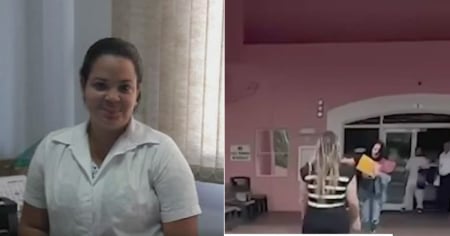There are dreams that feel so real that one wakes up with a lump in their throat. This happened to a young Cuban woman who, in a recent dream, was once again embracing her mother in Cuba after years of being apart. But upon opening her eyes, everything vanished. Reality hit her hard: she is far from her loved ones and trapped in the uncertainty of being I-220A in the United States.
With the excitement of her story shared by so many others and a message of hope, @laflaki1304, known on TikTok as La Cubanita Soñadora, addressed those living in the same situation: "Only we know and understand everything we have been through." In her video, which has already garnered over 1500 likes and 190 comments, she shared a unique dream where she not only got to hug her mother but also brought gifts to her entire family. Although they were not made of gold, but of surgical steel, everyone was happy, she said with laughter and emotion.
The creator, who traveled alone across several countries to reach the U.S., stated that she is not willing to return to Cuba, but the pain of distance weighs heavily on her. “Of course I miss them because I am a daughter, I am a good sister, I am a good granddaughter... If you don’t miss your family, it’s because you have no feelings," she expressed firmly, making it clear that her sacrifice is for her loved ones and that she does not lose faith in a better future: "Something good will happen in January."
The story resonated with many. Hundreds of users with the same immigration status shared how they also dream of returning to Cuba, even if only in their dreams. “I dreamed that I was hugging my grandmother who passed away five months ago”; “I literally imagine my kids are in Cuba”; “I've been eight years without seeing my family,” recounted several users. Others, however, reminded them of the sensitivity of these statements: “That's why they don't want to give us papers, because we talk about returning to Cuba,” one person commented, while another remarked: “I prefer papers over living in a dictatorship. Blessings.”
Between the pain of separation and faith in better times, @laflaki1304 concluded her video with a phrase that leaves a door open to hope: "Let's not lose hope. Something good is going to happen in January."
Frequently Asked Questions about Family Separation and the I220-A Status of Cubans in the U.S.
What is the immigration status I220-A and how does it affect Cubans in the United States?
The I220-A is a parole document that allows migrants to stay in the United States while their immigration status is being decided. For many Cubans, it represents a legal limbo, as it does not allow them to obtain permanent residency or return to Cuba without risks, complicating their situation and that of their families.
How does family separation emotionally impact Cubans in the U.S.?
Family separation has a profound emotional impact on emigrant Cubans, who often suffer from nostalgia, sadness, and anxiety. Holiday dates and important family moments intensify these feelings by reminding them of the absence of their loved ones.
Why do some Cubans have nightmares about being trapped in Cuba?
The fear of being trapped in Cuba is a common nightmare among Cubans who still do not have legal residency in the United States. This fear reflects the uncertainty and stress they feel about their immigration situation, as returning to Cuba could mean not being able to return to the United States due to legal restrictions.
What challenges do Cubans with I220-A status face in the United States?
Cubans with I220-A face multiple challenges, such as legal uncertainty, a lack of access to permanent residency, and the constant fear of deportation. Additionally, they must adapt to the economic and cultural differences in the United States, which can be a complex and stressful process.
Filed under:
